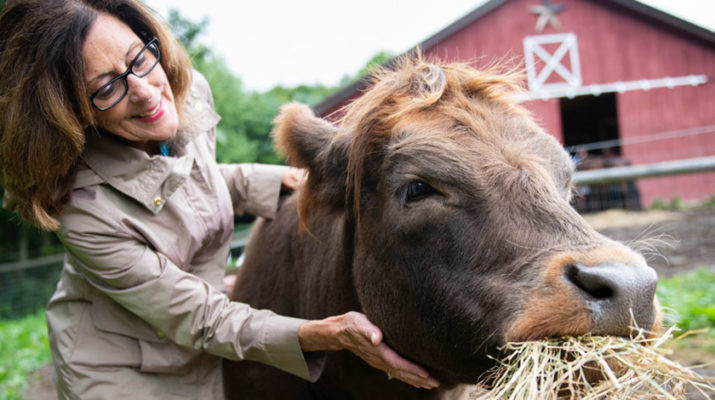Use of pets to de-stress is one of the reasons, experts say
By Deborah Jeanne Sergeant

No wonder about 85 million American households in the U.S. have animals, according to figures from Human Animal Bond Research Institute.
Whether it’s a pleasure horse or a pet poodle, an animal brings companionship, activity and a few health benefits, like lowered blood pressure and reduced risk of stroke and heart attack, according to numerous studies.
More people than ever have tapped into the benefits of emotional support animals and therapy animals, which can help with anxiety, post-traumatic stress disorder, and many other mental health issues. But outside those concerns, many people crave connections with animals and find them relaxing.
Suzanne Vullers operates Mountain Horse Farm in Naples, a B&B operation that provides guests with “cow cuddling” and a “horse and cow experience” with her six horses and two cows.
Vullers wants to give her clients the same experience she gets from it: “Connecting with nature and animals — in this time, we’re so focused on being inside and in front of screens. Everything you can do virtually.”
She wants to offer guests a reprieve from screens and the companionship of farm animals, such as lying in a pasture against one of her placid cows or grooming friendly horses. Vullers is certified by the Equine Assisted Growth and Learning Association, an organization for mental health and equine professionals that incorporates horses to address mental health and personal development. She has worked with horses all her life.
“I know what they do for me,” she said. “It’s always been the relationship, not competing and winning prizes. It’s always been about getting that connection and forming that friendship.”
When visiting family in the Netherlands, she observed similar work with cows and realized she needed to add bovines to her herd.
“We work with them differently, as cows like to lie down,” Vullers said. “They’ll lie down for long periods of time. Horses, they don’t really interact that way with people they don’t know. They may lie down, but that’s rare.”
By offering experiences with both animals, Vullers can meet the needs of more guests who crave animal interactions. To meet her animals’ needs, she limits the opportunities for guests to visit with the animals to one to two sessions up to four days a week and hosts the interaction in a space where the animals are free to move around.
“You see the animal relax,” Vullers said. “That’s where the benefits of your heart rate and blood pressure going down and you relax and can breathe. All that good stuff happens because it comes from mutual desire to connect.”
It seems that many people in recent times are seeking animal companions. Cheri Roloson, farm manager at Cracker Box Palace in Alton, has noticed an uptick in adoptions from the shelter’s rescued farm animals.
It’s hard to say exactly why, but since the beginning of the coronavirus crisis, “we’ve had so many adoptions,” Roloson said. “We were at 246 animals before. It’s gone way, way down. We’re all a little nervous about when people go back to work and they may want to return them. People have time now and it’s companionship and something to do.”
She said that part of the reason people de-stress in the presence of animals is that “animals don’t judge people. They don’t care as long as you’re kind to them and feed them. We’ve seen it here a million times.”
Even visiting the animals seems to bring some people benefits. Though not a formal animal therapy site, shelters such as hers can offer opportunities for animal interactions. Cracker Box allows visitors and hopes to do so again once social isolation is over.
Roloson knows of a dialysis patient who would regularly stop in to visit the animals and find that his blood sugar and blood pressure stabilized. Another man undergoing chemotherapy would stop and pet a horse over the fence.
“He said it got him through the treatments,” Roloson said. “You can tell a horse anything.”
She advises anyone seeking to adopt an animal to check with their municipality’s zoning laws for farm animals or exotic pets and to research the type of animal in question. Shelters like Cracker Box perform a site check and confirm that those applying to take hope an animal can adequately do so, including securing a veterinarian.
“Anyone can foster an animal, and we encourage that, especially with larger animals, for three months,” Roloson said. “We have a clause in the contract that in any point in the animal’s life we have dibs on the animal for them to come back here.”
Of course, bringing home an animal without being ready can increase stress. Roloson encourages would-be owners to “go work with that kind of animal at a shelter or farm so you know what you’re getting into. Make sure you have a vet for your animal. They don’t always deal with potbellied pigs, for example. You really have to do your research.
“I know a lot of people are impulsive, but to really get that right connection and ‘happily-ever-after’ story, we are serious about when they adopt an animal from us,” she added.
Anyone seeking a farm animal “fix” can find it among the animals at Cracker Box, even if they cannot keep large animals at their property. Like most other shelters, Cracker Box Palace welcomes guests and volunteers, who complete orientation and training to work around the animals.
Those who want but cannot have a dog or cat may volunteer at shelters caring for pets, walk a busy or elderly neighbor’s dog or offer to pet sit at a friend’s home.
Photo: A guest at Mountain Horse Farm gets cozy with Bella the cow.

